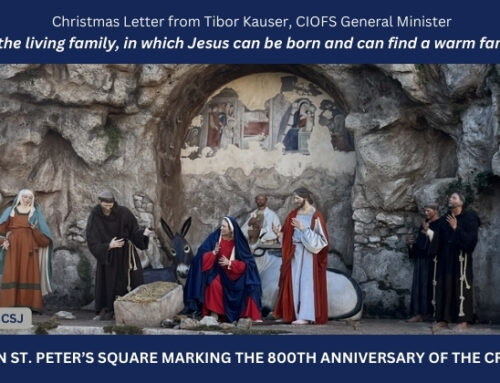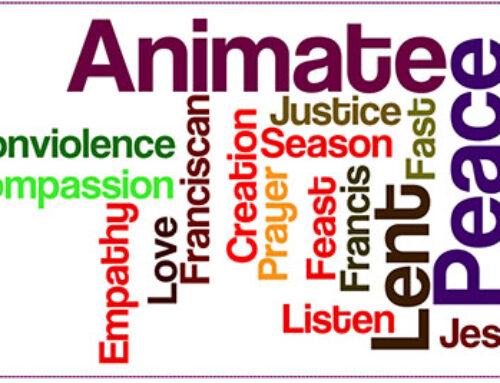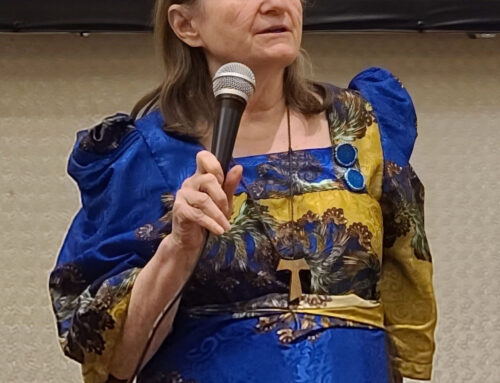 On Tuesday evening, October 15, 2013, I welcomed everyone to our National Chapter at the Savior Pastoral Center outside of Kansas City, Kansas, with the words: “Miserando atque Eligendo.” I chose these words because since our last National Chapter in 2012, we and the whole Catholic Church have been blessed with a new Holy Father, the first who had chosen the name of Francis! These Latin words form Pope Francis’ Papal Motto, displayed just below his Papal Coat of Arms. Even if they are hard words to translate, “Miserando atque Eligendo” are words clearly important to our Holy Father, and they should be important to us as followers of Christ in the footsteps of St. Francis and Pope Francis.
On Tuesday evening, October 15, 2013, I welcomed everyone to our National Chapter at the Savior Pastoral Center outside of Kansas City, Kansas, with the words: “Miserando atque Eligendo.” I chose these words because since our last National Chapter in 2012, we and the whole Catholic Church have been blessed with a new Holy Father, the first who had chosen the name of Francis! These Latin words form Pope Francis’ Papal Motto, displayed just below his Papal Coat of Arms. Even if they are hard words to translate, “Miserando atque Eligendo” are words clearly important to our Holy Father, and they should be important to us as followers of Christ in the footsteps of St. Francis and Pope Francis.
The words, “Miserando atque Eligendo,” come from a description of the Call of Matthew by St. Bede, given in the Second Reading from the Divine Office for the Feast of St. Matthew on September 21. The whole Latin description “Vidit ergo Jesus publicanum, et quia miserando atque eligendo vidit, ait illi, ‘Sequere me’.” might be translated as “Jesus therefore sees the tax collector, and since he sees by having mercy (or by looking at him with the eyes of mercy) (or by “mercy-ing” him, as the Holy Father has translated it) (miserando) and (atque) by choosing (eligendo), he says to him, ‘Follow me’.”
Thus, St. Bede’s inspiring homily offers a meditation on divine mercy, for Jesus calls Matthew (which means “gift of God”) not for what he was (a tax collector and sinner), but for what he could be (an Apostle and Gospel writer) if he only said yes to the grace of God. And once he said yes to God, “Matthew drew after him a whole crowd of sinners along the same road to salvation,” writes St. Bede.
According to the news agency ZENIT, which quoted a communiqué about the Papal Motto, a young Jorge Bergoglio, at the age of 17, after Confession, “experienced in a particular way, the loving presence of God in his life. . . . (H)is heart was touched by the descent of the mercy of God, who with tender love called him to the religious life” (http://www.zenit.org/en/articles/pope-s-motto-miserando-atque-eligendo).
Jorge Bergoglio became, of course, our new Holy Father, and in a now-famous interview (“A Big Heart Open to God” http://www.americamagazine.org/pope-interview), Pope Francis compares his own conversion to Caravaggio’s beautiful painting, “The Calling of St. Matthew,” hanging in Rome. And like St. Matthew, Pope Francis has spent the early days of his Papacy calling sinners to the mercy and salvation of God.
Although we may never become Popes, all of us have received the Lord’s mercy and have been chosen “before the foundation of the world to be holy and without blemish before him” (Ephesians 1:4). The Lord looked with love upon us when He chose us, perhaps through our parents and the Holy Spirit, to receive the great Sacrament of Initiation at our Baptisms. The Lord “mercied” us, if you will, and chose us when He called us to profess ourselves permanently as Secular Franciscans.
The Lord continues to look upon us with mercy and choose us at every Holy Sacrifice of the Mass as we receive His Body, Blood, Soul and Divinity. The Lord continues to love us and shower us with mercy every time we confess our sins and choose, only with God’s great grace, to begin a new life of grace. The Lord continues to mercy us, if you will, every day by sustaining our very lives and by choosing us to follow Him anew as we turn away from sin and are faithful to the Gospel, a conversion we Secular Franciscans must make on a daily basis, even today as we read these words (Secular Franciscan Rule 7).
You may recall a recent Gospel from St. Luke on the Twenty-fourth Sunday in Ordinary Time. There were three mercy-ings, if you will, the return of the prodigal son, the finding of the lost sheep and the finding of the lost coin (Luke 15:1-32). The parable of the prodigal son is justly famous and has already been given as a Gospel by itself on the Fourth Sunday of Lent, but consider for a moment the other shorter parables of the lost sheep and coin. A lost coin cannot find itself! I don’t know much about sheep, but I don’t think a lost sheep can find itself either! Perhaps as with the tax collector Matthew, conversion or repentance is not so much by our willing or doing it as by God looking at us with mercy and choosing us (miserando atque eligendo). God is always calling us, always seeking us, always mercy-ing us. All we have to do is allow ourselves to be found and then follow the Lord.
In joy, as did Jorge Bergoglio as a young sinner of 17, as does Pope Francis today, still a sinner, let us, in our own sinfulness, accept the Lord’s mercy and follow Him. How do we best follow the Lord? By doing what He did. In Matthew’s Gospel, our Lord tells us in the Sermon on the Mount, “So be perfect, just as your heavenly Father is perfect” (Matthew 5:48). In Luke’s Gospel, our Lord tells us in the Sermon on the Plain, “Be merciful, just as your Father is merciful” (Luke 6:36). Perhaps the closest we can come to imitating the Lord’s perfection is by extending the Lord’s mercy and election (miserando atque eligendo) to all we meet.
This may indeed be the New Evangelization in our broken, often unmerciful, world: to proclaim to all, especially those who may feel the most lost, that Jesus is calling all in love and mercy to follow Him. This surely is one interpretation of the new theme adopted for all of us for all of 2014 by the National Fraternity at the end of our National Chapter in Kansas City, Kansas, on Saturday, October 19, 2013: “Be the Merciful Presence of God.”
Let us take this theme, let us take the Pope’s Motto, let us take the mercy we have all received and give that mercy to all we meet.
Reflection Questions
- Whose motto is “Miserando atque eligendo”?
- How would you translate this motto into your own words?
- How did Matthew the tax collector experience the Lord’s mercy and call? What did he do?
- How did a young Jorge Bergoglio experience the Lord’s mercy and call? What did he do?
- How have you experienced the Lord’s mercy and call? What have you done?
- What might be the best way we could further the New Evangelization?
- What was the National Fraternity’s Theme for 2014? How might you try to live this Theme today? How might your Fraternity better practice this Theme?
This is an excerpt from a series of articles by the late Deacon Tom Bello, OFS, former Minister of the National Secular Franciscan Order – USA. “Many of these essays were originally published in TAU-USA, our national newsletter,” said Jan Parker, OFS, current National Minister. “They are excellent for reflection and ongoing formation.” Jan helped Tom publish these essays in book form. It is called For All The Saints: St. Francis’s Five-Point Plan for Salvation and is available from Tau Publishing. These excerpts will appear several times a week on the Secular Franciscans website.





Leave A Comment